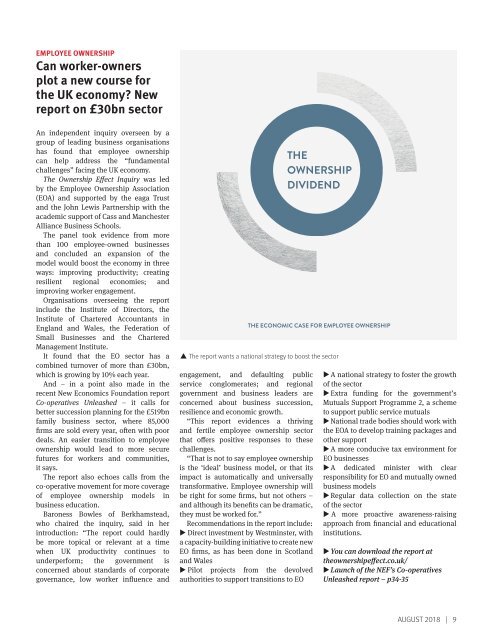AUGUST 2018
The August edition of Co-op News looks at how the co-operative movement can grow - but also thrive. Plus case studies from the US worker co-op movement, and how co-ops are embracing spoken word to tell the co-op story.
The August edition of Co-op News looks at how the co-operative movement can grow - but also thrive. Plus case studies from the US worker co-op movement, and how co-ops are embracing spoken word to tell the co-op story.
You also want an ePaper? Increase the reach of your titles
YUMPU automatically turns print PDFs into web optimized ePapers that Google loves.
EMPLOYEE OWNERSHIP<br />
Can worker-owners<br />
plot a new course for<br />
the UK economy? New<br />
report on £30bn sector<br />
An independent inquiry overseen by a<br />
group of leading business organisations<br />
has found that employee ownership<br />
can help address the “fundamental<br />
challenges” facing the UK economy.<br />
The Ownership Effect Inquiry was led<br />
by the Employee Ownership Association<br />
(EOA) and supported by the eaga Trust<br />
and the John Lewis Partnership with the<br />
academic support of Cass and Manchester<br />
Alliance Business Schools.<br />
The panel took evidence from more<br />
than 100 employee-owned businesses<br />
and concluded an expansion of the<br />
model would boost the economy in three<br />
NSORS AND ways: SUPPORTERS improving productivity; creating<br />
resilient regional economies; and<br />
improving worker engagement.<br />
Organisations overseeing the report<br />
include the Institute of Directors, the<br />
Institute of Chartered Accountants in<br />
England and Wales, the Federation of<br />
Small Businesses and the Chartered<br />
Management Institute.<br />
It found that the EO sector has a<br />
combined turnover of more than £30bn,<br />
which is growing by 10% each year.<br />
And – in a point also made in the<br />
recent New Economics Foundation report<br />
Co-operatives Unleashed – it calls for<br />
better succession planning for the £519bn<br />
family business sector, where 85,000<br />
firms are sold every year, often with poor<br />
deals. An easier transition to employee<br />
ownership would lead to more secure<br />
futures for workers and communities,<br />
it says.<br />
The report also echoes calls from the<br />
co-operative movement for more coverage<br />
of employee ownership models in<br />
business education.<br />
Baroness Bowles of Berkhamstead,<br />
who chaired the inquiry, said in her<br />
introduction: “The report could hardly<br />
be more topical or relevant at a time<br />
when UK productivity continues to<br />
underperform; the government is<br />
concerned about standards of corporate<br />
governance, low worker influence and<br />
p The report wants a national strategy to boost the sector<br />
engagement, and defaulting public<br />
service conglomerates; and regional<br />
government and business leaders are<br />
concerned about business succession,<br />
resilience and economic growth.<br />
“This report evidences a thriving<br />
and fertile employee ownership sector<br />
that offers positive responses to these<br />
challenges.<br />
“That is not to say employee ownership<br />
is the ‘ideal’ business model, or that its<br />
impact is automatically and universally<br />
transformative. Employee ownership will<br />
be right for some firms, but not others –<br />
and although its benefits can be dramatic,<br />
they must be worked for.”<br />
Recommendations in the report include:<br />
Direct investment by Westminster, with<br />
a capacity-building initiative to create new<br />
EO firms, as has been done in Scotland<br />
and Wales<br />
Pilot projects from the devolved<br />
authorities to support transitions to EO<br />
THE<br />
OWNERSHIP<br />
DIVIDEND<br />
THE ECONOMIC CASE FOR EMPLOYEE OWNERSHIP<br />
A national strategy to foster the growth<br />
of the sector<br />
Extra funding for the government’s<br />
Mutuals Support Programme 2, a scheme<br />
to support public service mutuals<br />
National trade bodies should work with<br />
the EOA to develop training packages and<br />
other support<br />
A more conducive tax environment for<br />
EO businesses<br />
A dedicated minister with clear<br />
responsibility for EO and mutually owned<br />
business models<br />
Regular data collection on the state<br />
of the sector<br />
A more proactive awareness-raising<br />
approach from financial and educational<br />
institutions.<br />
You can download the report at<br />
theownershipeffect.co.uk/<br />
Launch of the NEF’s Co-operatives<br />
Unleashed report – p34-35<br />
<strong>AUGUST</strong> <strong>2018</strong> | 9


















